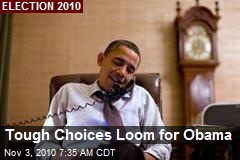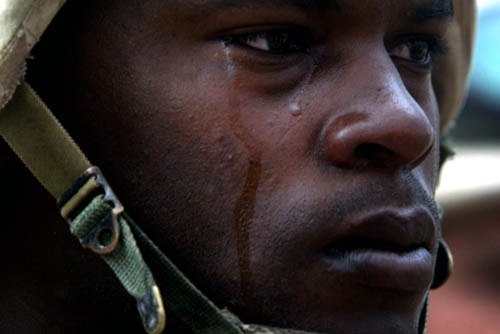“I can see that in the midst of death life persists,
in the midst of untruth truth persists;
in the midst of darkness light persists.”
~ Gandhi
Our world is on the brink of economic and ecological collapse: the dissolution of union rights in Wisconsin, immigrant deportation in Arizona, rockets firing in Israel/Palestine, nuclear disaster in Japan, violent revolution in Libya, and the list goes on, call on our conscience and we seek redress, resolution. 
The President and his co-workers are between a rock and a hard-place all hours of the day, examining as they must the most challenging issues of a generation. They are faced with making “tough decisions” and “hard choices” because we the citizenry have put them in the position to do so on our behalf. We have no reason not to believe that they are indeed hard choices that somebody has to make, or that somebody must be a representative who is capable of these choices. But what if we thought differently: that we, too, were capable of influencing the direction of these hard decisions? According to Jean-Paul Sartre, the human being is condemned to liberty, that is, to choice and as it were, to responsibility for our choices. So, if it is impossible for us to call on representatives to absolve us of our responsibility, why do we endow them with the overriding power to absolve us of our decision -making? Let’s examine together what it takes for a person make a really tough decision—the decision to stop believing in the moral necessity of war.
The decision-making process is a largely unconscious strategy we have developed over the course of our life’s experiments in moral action to achieve our desired ends with minimal harm to ourselves. I say “largely unconscious” because if we were aware of every single decision that we made throughout the course of a given week, we would be astounded: every single thought, word and action is actually a choice. Briefly stated, our lives are dominated by the liberating concept of choice even at this very moment. Examining this notion of constant choice reveals that while I am constantly engaged in choice, I am also distracted by my thoughts and feelings about my specific preferences, not to mention the potential dangers of intoxicating substances (such as the double latte from down the block which sets my nerves on edge) influencing my attachment and identification to my thoughts and feelings. Take the example of the aforementioned latte. In spite of its negative effect, I still make the choice of ordering the drink that I know will lead me into a tail-spin for the rest of the day. I know it is bad for me; I know it is bad news for those around me, but it was a “tough-choice” and I made it.
Sound ridiculous? It is, and it is precisely the point that I want to illustrate. A tough decision does not mean taking the course of action that we know from past experiences will lead to negative and damaging results. Yet our foreign policy insists on the use of violence to solve its problems and calls such decisions “tough” or “hard.” Using violence is not a hard choice because violence does not challenge us to become better. There is nothing hard about it. Nor is it a tough choice. Rather, what our government calls tough is nothing more than a misnomer for its weakness. When “tough decisions” and “hard choices” are made, we may as well think of them as “bad choices,” and “weak decisions.” Until we adopt nonviolence as domestic and foreign policy (or as we say at the Metta Center, until the right kind of power is aroused in people), we will remain weak, making bad choice after bad, awkward choice.
Why nonviolence? According to Gandhi, the first person to apply the principle of nonviolence to a large-scale movement in both South Africa and India, nonviolence is our natural state, and we reach our natural state when we awaken to our spirit. (Another term he used to describe the application of nonviolence to large-scale action was soul-force.) Without our spirit, we are determined, material beings who, as a Texas school-teacher Todd Diehl recently discovered with his high-school students, are told that we are incapable of resisting M&M candies, let alone violence. As we contact that spirit within that Gandhi describes so eloquently in his numerous writings and talks, we begin to realize that we are in control of our destinies insofar as we take our choices into our own hands, and make good decisions so often that they begin to seem as if being good were indeed our natural state. As it turns out, it is. Gandhi was convinced that destruction was not the law of humanity. When we identify with the nonviolence within ourselves, we are merely turning the flashlight outward from personal self-interest to interest in the welfare of the entire world, of all of life. 
When I make a real tough decision, I do so to the benefit all, with minimal harm and maximum good done to the whole. This unifying thread of awareness is the absolute basis of the nonviolent worldview according to Gandhi. This was echoed in the principles of Martin Luther King, Jr. when he said, “I cannot be what I ought to be until you are what you ought to be; and you cannot be what you ought to be, until I am what I ought to be.” In other words, when we cease to identify ourselves with our private dreams of success and end the competition for personal satisfaction, we identify with our nonviolent, authentic and absolute self– the greater, interdependent whole where our well-being is not in competition with others.
The nonviolent choice is not an easy choice – at least not at first. Gandhi described a rule of thumb that we can use: whenever we are faced by two choices, take the choice that is the most inconvenient to oneself. In other words, take the hard choice. This can be applied from the most mundane, such as the latte, or the most sublime, such as a foreign policy based on generosity (see: the Network of Spiritual Progressives). The reasoning is simple, for Gandhi, the nonviolent actor (or satyagrahi) must be willing to make sacrifices, even of one’s own life, if need be, because his nonviolence is one of voluntary self-sacrifice, and the purification of an individual’s motives which when done sincerely can influence a movement and like a pinch of yeast, leaven the culture. Michael Nagler recently pointed out in our op-ed “Catastrophe Calling” that “our highest self is our real self” which immediately ties into our hard choices because the choice that does us the most inconvenience is so often that which does us finally the most good: it brings us closer to seeing and falling in love with our highest self which is humanity itself. And let’s face it: what’s not hard about love? Still, it persists in the midst of a world marred by hatred, and that must be our proof that it is what we really want; that our decisions must be informed by and oriented toward this humble and powerful choice. It is this constant decision that will lead us to see that violent warfare is the weak choice of an individual as well as a nation, and that the perceived need for it is a sign of the weakness of our conviction for lasting peace. Before us we have a great challenge: when we abandon the necessity for war and its violence, what will be the concrete strategies, attitudes and institutions we need to adopt and sustain as its replacement? The compassionate Buddha was among the first to teach the necessary guiding principle for such politics to his disciples long before our day; so let us remind ourselves and stand in reverence of his words for our sacred mission, “Hatred never ceases by hatred; hatred ceases by love. This is an unalterable law.”









I agree. This is a really good point. It is harder to make peace than War. When we make War we cover it by saying it was hard, when actually it is the easiest course.
Excellent post for making us all think about how we make decisions and the potential effects of those decisions.
As a student of behavioral economics and decision making for the past 15 years, it has become clear to me that most of our short-cuts we use in making choices often lead to some form and magnitude of violence either against ourselves and often including others in the detrimental effects.
These “short-cuts” are cognitive conveniences which, to use Professor Nagler’s terminology, “work” but don’t work.
Even your simple but illuminating example of your morning latte purchase has at it’s root, convenience in making your choice, a choice which ultimately leads to a modicum of violence and suffering for you and your body due to jitters and edginess.
The world of violence is rife with decisions made based on heuristics or rules of thumb which led to outcomes far worse than ever expected.
Even worse is conflict scenario planning for templated events, the plans for dealing with these events including the use of escalating violent tactics leading ultimately to full-on military actions. Until we can create scenario plans which exclude violent actions and include non-violent means we will be afflicted by this disease of violence and war, not to mention an economy more and more dependent upon it.